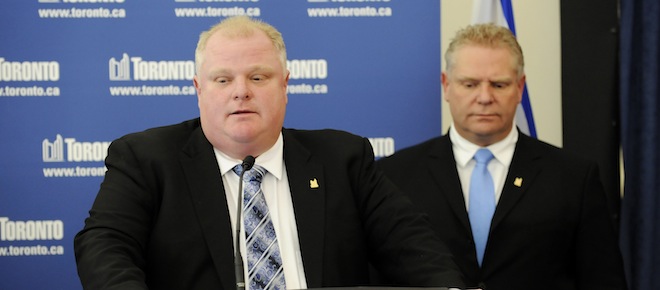Rob Ford and the campaign ahead
Ivor Tossell on the Toronto mayor’s prospects
Toronto Mayor Rob Ford speaks to the media at City Hall supported by his brother, Councillor Doug Ford (R) after winning his conflict of interest appeal in Toronto, Ontario, January 25, 2013. REUTERS/Jon Blacker (CANADA – Tags: POLITICS)
Share

We all returned today to the member’s lounge beneath the sweeping dome of city council, where two months earlier, the mayor of Toronto stood, blotchy-faced, broken-voiced, and apologizing. On that day, he had been ordered from office for breaching conflict-of-interest laws – pending an appeal. Rob Ford was in a better mood this morning. At 10:30 a.m., the courts announced he’d won the case on appeal, and that his mayoralty would survive.
Today Rob Ford braced himself behind the same podium and looked, for a moment, like he was about to turn a page. He said he was humbled. He said he’d found support “at every gas station, at every restaurant,” his preferred method of taking the city’s pulse on any given file. Then he explained that he was running the city better than any administration ever has, that “95 per cent of the people out there supported me,” and that he’s going to be mayor for the next six years. It was like listening to a greatest-hits album.
So the fresh start will have to wait. To the undisguised delight of journalists everywhere, we get more Rob Ford. However, despite the fact that he’s still in charge, there’s not much of his mayoralty left but one long campaign.
Today’s appeal win wasn’t exactly a vindication: A three-judge Divisional Court panel let Ford off the hook on a jurisdictional issue, not on any question of whether he was right or wrong. In essence, the court ruled that Toronto’s council didn’t have the authority to ask Ford pay restitution for dubiously-solicited football charity donations, so everything that followed, including Ford speaking and voting not to have to pay, was a nullity.
“Nullity”–just one of the fun new words we’ve learned in this saga–also describes the mayor’s remaining political clout. He’s spent the last two months in a state of limbo, on the heels of a term that was calamitous enough to begin with. Just last week, after a year of deliberations, Ford impulsively voted against his own penny-pinching budget; a loose cannon on council proposed a spur-of-the-moment tax freeze and, like a retriever after a squirrel, Ford couldn’t resist. His budget chief quit in frustration. It would have been a good-news week for him otherwise.
Nor does he have smooth sailing ahead. Clayton Ruby says he’s going to seek leave to appeal this case to the Supreme Court, which seems like a long shot. And, as you’ve no doubt read, some of the same foes who launched the conflict-of-interest case have triggered an audit of Ford election finances, which is due out next week. This, too, could see him removed from office.
It is almost certainly better for the city that Rob Ford didn’t get turfed. The next two years would have been constant calamity–even more so than whatever Ford himself has in store for us next. All the same, regular mayoral races in Toronto last almost a year; the start of the 2014 election season is just 11 months away. Anticipating his possible removal, candidates across the city were assembling teams, hatching plans and bagging bagmen. The prospect of Ford’s ejection revved up the election machine a year early.
The mayor himself is going to have to start campaigning immediately just to assert his own relevance. Ford’s successful appeal is unlikely to give him much of a boost. In Rob Ford’s world of diminished expectations, victory is not self-destructing in one way or the other. But not getting fired is not the same as a renewed mandate.
For a populist, the ideal scenario is to get thrown out by the courts and then reinstated by the people. Ford’s hand actually would have been strengthened had he lost today, so long as he was either reinstated by council, or, more plausibly, returned in a by-election. As it stands, he’s been publicly humiliated, but denied the martyrdom that could have reignited his support.
His ability to lead derives from his public support and his ability to do the hard work of politics. That was never Ford’s strong suit; it can’t be transacted at the gas stations and restaurants of the city, conducted solely with people who come up to him on the street, or want him to pay a housecall.
Which leaves him with the only lever he ever had: Being the voice of Ford Nation, the man chosen by 383,501 as their guy at City Hall. His people, as always, will be with him, the core of support that he can’t be alienated from, and probably can’t grow past. He can rightfully claim to be hounded by foes who’ll stop at nothing to throw him out of office, a fact that hasn’t done any favours for the political climate in the city. But without an election to rally around, there’s not much outlet for that support.
The mayor himself isn’t much interested in changing. When reporters asked what he’d learned from this experience, he said he’d learned how popular he really is. “Even a lot of them said, I didn’t support you last time, but you’ve proved me wrong,” he said.
Rob Ford isn’t changing. The mayor may have kept his job, but there’s nowhere left for him to go but to the people. His opponents are already in motion. The 2014 mayoralty campaign has already begun.